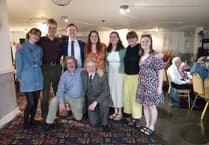For many, Dolgellau Music Club’s season's main chamber music concert is a highlight, and this year's did not disappoint.
A string trio formed for the occasion by members of the Pleyel Ensemble played splendidly in Coleg Meirion-Dwyfor on Friday, 23 February, and once again the hall's warm acoustic made the listening experience deeply satisfying.
All three musicians are highly experienced, with roles including those of violinist Sarah Ewins as associate leader of the Hallé Orchestra, David Aspin as principal violist of the Orchestra of Opera North, and Heather Bills as principal cellist of the Welsh Chamber Orchestra. Seasoned chamber players also, their integration as a trio was impeccable.
Born a year after Mozart but living twice as long, the eponymous Ignaz Pleyel is best known today as founder of a piano business that supplied Chopin, no less; but in his day the music he composed was wildly popular, even giving rise to a Pleyel Society on the island of Nantucket off the coast of Massachusetts!
His genial String Trio in G Op.44 No.1 made an ideal opener, and Schubert's youthful single-movement String Trio in Bb D471 was equally tuneful.
This prepared listeners well for the String Trio D51 written in 1950 by Arnold Cooke (1906–2005), a British composer only now coming into his own thanks to modern recordings (several of them by the Pleyels). Accessible yet original, all agreed this work too should be recorded.
Viola and cello opened the second half in Beethoven's 'Eyeglass' Duo WoO.32, a piece Beethoven probably wrote for himself and his cellist friend Baron Nikolaus Zmeskall whom he was known to tease for his short-sightedness!
In the absence of a violin part the cellist has to play formidably high at times, a challenge which Heather negotiated with aplomb. David made the very most of having all the upper melodies to himself (not so common an opportunity for viola players...).
The programme then reached an exhilarating climax with Ernö von Dohnányi's five-movement Serenade in C Op.10 of 1902, a work full of light and shade that showcased the trio's skills as virtuosi, but also showed them to be listening players who revelled in living up to their title as the Pleyel Ensemble.




.jpeg?width=209&height=140&crop=209:145,smart&quality=75)